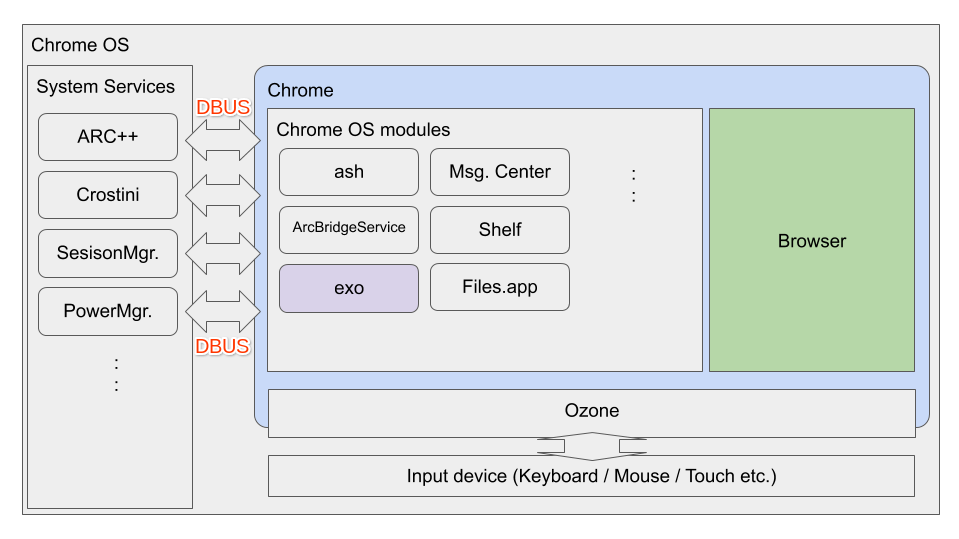Using delegates to Resolve Dependency Issues
Chromium Repo Dependency Checks
The Chromium repository has strict restrictions on which modules are able to depend on the top level //ui, //chrome, or //content directories.
Directly from the //chromeos README:
- “This directory contains low-level support for Chrome running on ChromeOS.”
- “//chromeos does not contain any user-facing UI code, and hence it has "-ui" in its DEPS. The contents of //chromeos should also not depend on //chrome or //content.”
These limitations are enforced using "-chrome" in the DEPS file and apply to the //chromeos, //ash/webui, and other low-level directories in the repository.
When these rules are violated (by including a file from //chrome/…), attempts to upload the offending CL will display the following message:
Running Python 3 presubmit upload checks ...
** Presubmit ERRORS: 1 **
You added one or more #includes that violate checkdeps rules.
ash/webui/file_with_violation.cc
Illegal include: "chrome/browser/utils.h"
Because of "-chrome" from ash/webui's include_rules.
Presubmit checks took 5.4s to calculate.
There were Python 3 presubmit errors.
The diagram below gives a rough visualization of the separation of components in ChromeOS.
 ChromeOS
architecture pre-LaCrOs
ChromeOS
architecture pre-LaCrOs
Delegate pattern to use Chrome from Ash
There will be numerous occasions where services in //ash/webui will need access to functions and data only available in //chrome (to access the logged-in user’s Profile for example).
To avoid repo dependency violations, in these situations we can utilize the delegate pattern to get the data/invoke the actions needed. The delegate pattern (summary) in the diagram below shows a simplified version of a function in //ash/webui using a delegate to invoke a function in //chrome.
 Sample
delegate pattern diagram
Sample
delegate pattern diagram
Creating a delegate
The below steps will use the existing Scan App implementation in //ash/webui to demonstrate examples of the delegate pattern.
Define the functions in the header
Here the functions are defined which will be invoked by our //ash/webui service. This header file will be created in //ash/webui so the service’s .cc file will be allowed to call/depend on it.
class ServiceDelegate {
public:
virtual ~ServiceDelegate() = default;
virtual std::string GetStringFromChromeBrowser() = 0;
};
Scan app example
Create the implementation class
Since functions in //chrome can’t be called from //ash/webui, the functions defined in the delegate header need to be implemented by a file located in //chrome.
.h file
class ChromeServiceDelegate : public ServiceDelegate {
public:
ChromeServiceDelegate() override;
std::string GetStringFromChromeBrowser() override;
};
Scan app example
.cc file
ChromeServiceDelegate::ChromeServiceDelegate() = default;
std::string ChromeServiceDelegate::GetStringFromChromeBrowser() {
return chrome::ChromeBrowserFunction();
}
Scan app example
Pass the delegate implementation to the service
Probably the most difficult part in the process, the service in //ash/webui needs to be given access to an instance of the delegate implementation created in //chrome. This requires the app to be created/launched from //chrome. Here are two examples of correctly setting up and passing the impl: Scan app example via chrome_web_ui_controller_factory.cc Diagnostics Log Controller example via chrome_browser_main_parts_ash.cc
Invoke the delegate function from the service
Once the delegate impl is passed to the service and stored as a private local variable, any function defined in the delegate header can now be invoked without worry of dependency conflicts.
.h file
class Service {
private:
std::string UseStringFromChrome();
// Provides browser functionality from //chrome to the Service UI.
std::unique_ptr<ServiceDelegate> service_delegate_;
};
Scan app example
.cc file
std::string Service::GetStringFromChromeBrowser() {
service_delegate_->GetStringFromChromeBrowser();
}
Scan app example
Example CL
- crrev.com/c/3290952